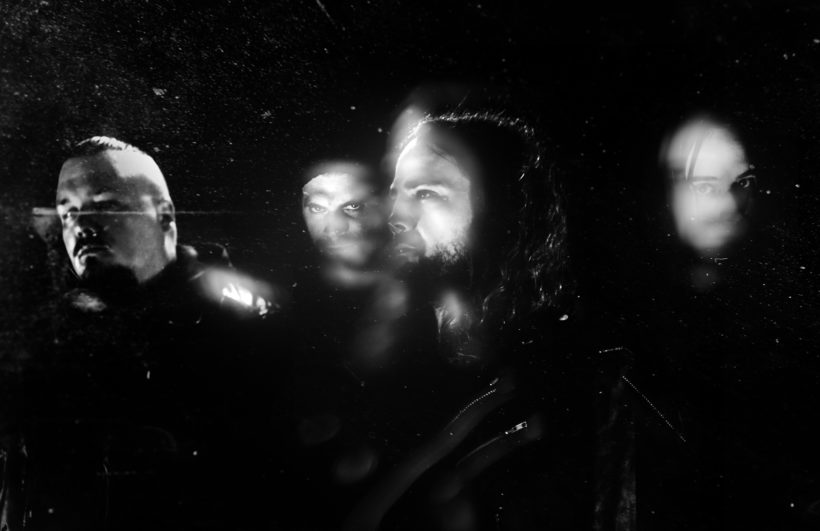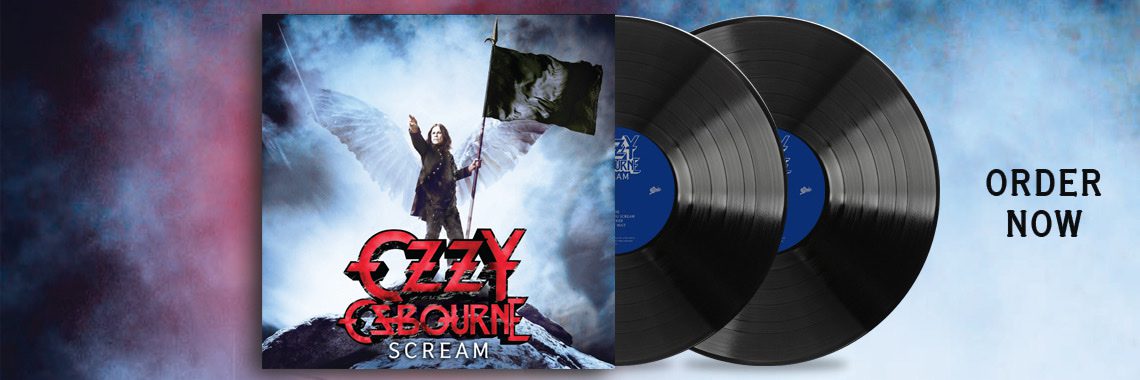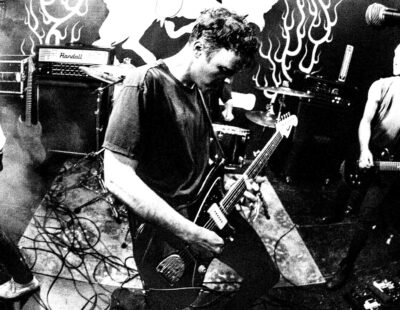
American black metallers Chaos Moon released one of the best albums of 2017. Just too late in the year to be absorbed, understood, and heralded by most for inclusion in year-end Top Lists. Nevertheless, Eschaton Mémoire‘s greatness isn’t predicated on mass acceptance or Top 10 placements, but rather the intent and content within. To wit, the 40-minute monster blends heavy doses of atmosphere and aggression, to believable results. While guitarists Alex Poole and Steven Blackburn ensorcell–the din and beauty of the two-part “The Pillar, the Fall, and the Key” songs are easy rabbit holes to fall into–, Eric Baker growls and squawks an end-time message that paints a very dark picture. The Philadelphians are journeymasters, able to cast off into dreamland with the quickest of turns or descend into the vantablack abyss with ease, often within the same song. This isn’t the black metal of Satanic overtures or anti-Christian posturing, but rather something more profound. Just as Dante wrote about the nine circles of Hell, Chaos Moon’s Eschaton Mémoire is a similar venture through layers of bewildering contentment and horrifying horrors.
Decibel sits down for a quick conversation with Poole, Baker, and Blackburn to talk the scrapping of Eschaton Mémoire‘s predecessors, Eschaton Mémoire itself, and Emperor’s indelible influence on Chaos Moon. If you haven’t heard Eschaton Mémoire, it’s a must. On par with Emperor’s Anthems to the Welkin at Dusk, Deathspell Omega’s Si Monvmentvm Reqvires, Circvmspice, and Darkspace’s III. Check it out on Bandcamp HERE.
How different is Chaos Moon now compared to the early days? Has your perspective changed?
Alex Poole: There is no difference. The foundation and principles has remained the same since we started releasing music publicly. As with any band or artist, our sound has probably matured quite a bit. We’re more aware of what works and what doesn’t. But, it still feels like it did 14 years ago.
What is black metal? A sound, a movement, a culture? Or, is it merely and simply the song of opposition, to the other and to itself?
Alex Poole: Total freedom, chaos, and rebellion within the individual, an extreme interpretation of rock music, to put it simply. I do not romanticize the genre, its origins, or the individuals involved. It is not my identity. It is up to the individual how far it is taken or interpreted, nothing is concrete.
You’re the mastermind behind Chaos Moon. Has the addition of Eric and Steven altered the Chaos Moon dynamic?
Alex Poole: Eric, Steve, and Jack [Blackburn] helped expand on the dynamic that was already established. I’ve worked and written with these guys for over a decade in some cases, they understand what makes the band tick and how to push it further without coloring the overall sound in a way that would compromise the band. When writing the album, we were instantly on the same page, working almost as a single, shared mind. Everything fit together seamlessly.
Steve Blackburn: I didn’t feel like I had to acclimate myself to how I should write anything. Even though this is the first album I actually participated in, my history with the band made it clear as to how to approach the writing process.
I understand you Chaos Moon had a complete full-length that was scrapped to write Eschaton Mémoire. Prior to that, a near-complete album. What was the motivation to start over again?
Alex Poole: The scrapped version of the album was submitted for pressing, but I was not totally happy with the outcome. Too broad and unfocused, but I settled for it and started writing new material for a split. The newly written material ended up being exactly what I wanted the full length to be, which lead us to start from scratch. Steve and I immediately starting writing, which lasted a few months, and we ended up with the version released today. Very natural writing process, everything snapped into place.
Eric Baker: Alex and I poured hours of work into the first iteration of this record. After repeated listens, it felt like a good album, but not a great one. For Alex to have revived this project for a mediocre effort would have done an injustice to Chaos Moon prior to my involvement. It was a difficult decision, but ultimately the right one. The moment that Steve and Jack were also added to the lineup, inspiration surged on all fronts. Much time and work went into Eschaton Mémoire, but on the second attempt, it felt much more natural and focused.
Did you know what had in the Eschaton Mémoire material while writing? I gather the fear that the material would again not stand up could’ve surfaced again.
Alex Poole: We had our end-goal laid out with Eschaton Memoire, it was only a matter of creating everything else to match, no matter how long it took. Luckily, we hit a moment of clarity and abused the fuck out of it while we could.
Eric Baker: The four of us set themes in a generic sense, in regards to the focus and where it needed to go. It was all about striking while the irons were hot. We all got to take these general ideas for the album and run with them how we saw fit on an individual level, and then weaved it into the vision the other three of us had for the end result. As I previously mentioned, the entire process felt very natural, as cliche as that sounds.
Steve Blackburn: In some ways it was so clear to me what we were doing with the second attempt that there was no fear of failure.
Eschaton Mémoire is a very complex album. Are you anticipating listeners returning to it, to hear new layers in the chaos?
Alex Poole: Absolutely. Simple, easy to listen to and absorb music is great and there are plenty of bands/albums/songs I love that exploit simplicity, but my heart really lies with music that isn’t obvious. This isn’t an album to throw on at a party or to pop on for 30 seconds and expect to understand its motives. It requires patience. So much music is released and people are constantly consuming, shitting, and moving on to the next new thing, so this album could be seen as a counter to that. I want people to return to the album 5 years later and hear something new. Take drugs, shape the dense layers into something of your own.
Eric Baker: As with the music, I wrote the lyrics with the intent of repeated listens. My goal is for listeners to experience them in different ways over time. Yes, there are some pieces that are meant to be taken as face value (of course the entire record could be conceived that way), but there are many things hidden in metaphors, mythos, and other references that are meant for interpretation unique to each person.
There’s a nod to Emperor’s In the Nightside Eclipse on Eschaton Mémoire. How important are aggressiveness and atmosphere, two opposed sonic entities, to Chaos Moon?
Alex Poole: The contrasting of aggression and atmosphere is the most important element to Chaos Moon. Nightside Eclipse was my first large exposure to that train of thought and it hasn’t been topped yet. I think it transcends Chaos Moon though, it’s deeply embedded in any music I create and will likely remain for as long as I create music.
Back to Emperor, have you thought much about the age of Ihsahn and Samoth up to and during In the Nightside Eclipse? While most boys were chasing girls and trying to find themselves, they were writing a timeless masterpiece. Somewhat humbling in hindsight.
Alex Poole: Wherever your path leads you.
But there’s something else to Chaos Moon’s thrusting black. The opening to “The Pillar, The Fall, and The Key I,” for instance, is almost post-punk in tone. What other forms of art, musical or otherwise, is informing Eschaton Mémoire?
Alex Poole: For this album, I tried my hardest to strip away any obvious, direct influences and focus more on general feeling for the portions I wrote. It’s almost entirely influenced by the feeling of mystery or the unknown, from a writing standpoint. I do listen to a large assortment of musical styles and genres, but any influence on this album isn’t a conscious choice. Almost like automatic writing, but not as free-formed.
Lyrically, where are you centered on Eschaton Mémoire?
Eric Baker: Considering the album title and the lyrics being taken for their face value, it is eschaton being set in motion, through to the ultimate end. A sinister, dark ending to this world and this plane. Digging deeper into the songs, not just the lyrics, will reveal more. Rather than giving those obscured meanings away, I encourage people to interpret the album in a personal manner. I also challenge the listener to reach beyond themselves for what else can’t be seen in a literal sense.
Your Bandcamp site has the phrase: “Decided annihilation and meticulous rebirth, Eschaton Mémoire marks the beginning of a new era for Chaos Moon; one that shall be ripe with decay.” Is destruction the path to creation? And creation the path to destruction?
Alex Poole: I suppose the universe works in a cycle until everything is depleted and creation is no longer possible.
The cover to Eschaton Mémoire is by Jef Whitehead. Was it a commission or chosen?
Alex Poole: We came to Jef with some stylistic ideas and concepts and he did the rest with little guiding. He knew exactly what we were after and delivered perfectly, one of the best artists to work with.
What does the Whitehead piece say to you? It’s fairly grotesque with a Dali edge to it.
Alex Poole: I sent Dali paintings as a reference for this piece, actually. I think his art reflects the lyrical and musical themes of surrealism and death perfectly. The art is a visual extension of the music.
Eschaton Mémoire was released late in 2017. Yet it ended up on a several high-profile year-end lists. Did the response surprise you?
Alex Poole: I try not to think too much about audience reception when I’m writing, so I had no expectations upon its release. I was very happy with how the album came out and it’s nice to see that people also relate to our work in a meaningful way. It’s very humbling.
Is there a place for acceptance in black metal? Acceptance from a wider audience than its creator or wider than the creator’s intention? I gather this question was also pertinent to the second wave of black metallers who suddenly found themselves in newspapers and on magazine covers.
Alex Poole: This boils down to the individual’s preference. I don’t really concern myself with the politics of black metal, I’m simply doing what I think I should be doing in my own isolated space. Extreme climates in society can reflect the art we make and what we expose ourselves to, so it’s not much of a surprise something as ‘extreme’ as black metal, or any other type of metal, has come to the surface a bit more in recent years. Larger following leads to greater output, more consumption, and all of the pros/cons that come with those thing. It’s harder to find unique new music. Each gimmick gets beaten to death before its cast aside for something else. People use music as a larger social tool rather than appreciating the artistry becomes more wide spread the bigger something becomes. Not to say people should stop writing music or doing whatever they’re doing, whatever their intent.
What’s next for Chaos Moon? Unknown or will there be chances of live exposure?
Alex Poole: We’re all involved in numerous projects, we are keeping busy with different expressions. We are also preparing to play live, but we’ll see if that actually happens.






